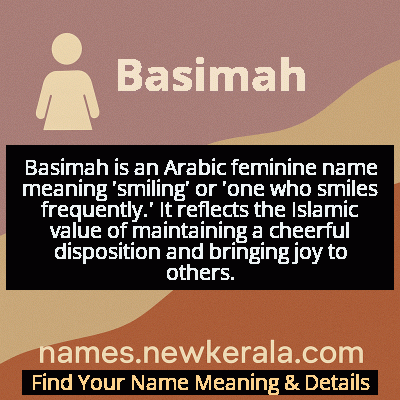Basimah Name Meaning & Details
Origin, Popularity, Numerology Analysis & Name Meaning of Basimah
Discover the origin, meaning, and cultural significance of the name BASIMAH. Delve into its historical roots and explore the lasting impact it has had on communities and traditions.
Name
Basimah
Gender
Female
Origin
Muslim
Lucky Number
8
Meaning of the Name - Basimah
Basimah is an Arabic feminine name meaning 'smiling' or 'one who smiles frequently.' It reflects the Islamic value of maintaining a cheerful disposition and bringing joy to others.
Basimah - Complete Numerology Analysis
Your Numerology Number
Based on Pythagorean Numerology System
Ruling Planet
Saturn
Positive Nature
Ambitious, efficient, realistic, and authoritative.
Negative Traits
Materialistic, stressed, confrontational, and can be overly ambitious.
Lucky Colours
Dark blue, black.
Lucky Days
Saturday.
Lucky Stones
Blue sapphire, amethyst.
Harmony Numbers
2, 4, 6.
Best Suited Professions
Business leaders, managers, financial services, law enforcement.
What People Like About You
Leadership, determination, organizational skills.
Famous People Named Basimah
Basimah bint Abdullah
Islamic scholar
Renowned Quran reciter and Islamic educator in Saudi Arabia
Basimah al-Hashimi
Academic researcher
Notable contributions to Arabic literature studies and women's education in the Gulf region
Basimah al-Mansouri
Community leader
Founder of women's empowerment organizations in North Africa
Name Variations & International Equivalents
Click on blue names to explore their detailed meanings. Gray names with will be available soon.
Cultural & Historical Significance
In many Arab and Muslim cultures, names are chosen not just for their sound but for their meaningful attributes that parents wish to instill in their children. Basimah represents the ideal of a woman who brings light and joy to her family and community. The name has been particularly popular in regions with strong Arabic linguistic traditions, including the Middle East, North Africa, and Southeast Asian Muslim communities, where it symbolizes the cultural appreciation for warmth and approachability in interpersonal relationships.
Extended Personality Analysis
Women named Basimah are typically associated with cheerful, optimistic personalities and a natural ability to uplift those around them. They often possess excellent social skills, easily making connections and creating harmonious environments. Their smiling disposition is not superficial but stems from genuine inner contentment and a positive outlook on life. Basimahs are usually empathetic listeners who can sense when others need emotional support.
In professional and personal settings, Basimahs tend to be diplomatic peacemakers who avoid conflict and seek collaborative solutions. They often excel in caregiving professions, education, or community roles where their natural warmth and approachability can shine. While generally gentle-natured, they can be surprisingly resilient when facing challenges, drawing strength from their optimistic worldview. Their laughter is often described as infectious, and they have a talent for finding joy in everyday moments.
Modern Usage & Popularity
Basimah maintains steady usage in Muslim communities worldwide, particularly in Arab countries, Southeast Asia, and among Muslim diaspora communities in Western nations. While not among the most popular names, it enjoys consistent moderate popularity due to its beautiful meaning and cultural resonance. In recent years, there's been a slight increase in its usage as Muslim parents seek names that are both traditional and meaningful without being overly common. The name is particularly favored by educated, urban Muslim families who appreciate its elegant sound and positive connotations.
Symbolic & Spiritual Meanings
Symbolically, Basimah represents the sunlight that breaks through clouds after rain - a beacon of hope and renewal. The name embodies the concept that true strength lies in maintaining joy and positivity even during difficult times. In metaphorical terms, Basimah symbolizes the garden where flowers of happiness bloom, the warm breeze that comforts troubled hearts, and the gentle light that guides others through darkness. It represents the Islamic principle that a smiling face is not just a personal attribute but a form of worship and community service.

